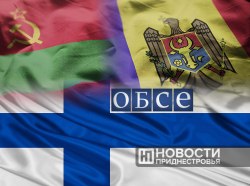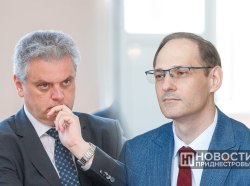It has long been desirable to raise the topic of media influence on the Moldo-Pridnestrovian settlement process. A few days ago, an additional information occasion emerged. A roundtable discussion on this issue was held in Bendery with the involvement of Pridnestrovian and Moldovan journalists. According to the organisers, the Institute for Socio-Political Studies and Regional Development, invitations to take part in the event had been sent to a much greater number of Moldovan media than actually came to Bendery. Therefore, when opening the round table, the institute director, Igor Shornikov, noted it was the third event held by the institute for the past six months to which Moldovan experts were invited. "Only ten percent of the invitees come," said Shornikov.
The deputy director of the institute, Andrey Mospanov, was absolutely right to note that the mass media "are able to make their own — positive or negative — contribution to the settlement, even regardless of politicians." The history of Moldo-Pridnestrovian relations has seen many examples where journalists first pinned labels on Pridnestrovie, and then those labels were used by Kishinev politicians. Moldovan media to this very day use the phrase "the so-called" in relation to the Pridnestrovian authorities and officials or put their names in inverted commas. They do so even when they report about official meetings of Moldovan and Pridnestrovian officials. Such an approach is illogical and does not facilitate in any way the settlement process.
Can Pridnestrovie and Moldova cooperate in the field of mass media? Hypothetically, yes. At the very beginning of the negotiation process, considerable significance was given to the mass media. Mospanov recalled in his reports several documents which were to facilitate interaction between Pridnestrovie and Moldova in the media field. The agreement on the peaceful settlement of the armed conflict of 21 July 1992 has a provision in compliance with which a press centre should be created under the Joint Control Commission. It is the only example of collaboration between Pridnestrovian and Moldovan journalists. Although other documents were subsequently signed in this sphere. In practice, none of them has been carried out, and even if some of them had been implemented, such an idyll did not last long. So, in 1994 the then communication minister of Moldova, Ion Casian, and his Pridnestrovian colleague, Vladimir Yefimets, agreed on the distribution of Moldovan and Pridnestrovian newspapers in their countries.
In the 1990s, Pridnestrovian papers Pridnestrovie and Adevarul Nistreanu could be bought in several kiosks in Kishinev, where they were quickly sold out. Today, these papers are also available in Moldova but only by subscription. Both papers, by the way, are subscribed to by the Moldovan authorities and some embassies in Kishinev. But they have long been unavailable for sale. In Pridnestrovie, Moldovan newspapers and magazines were supplied in larger quantities in those years but remained for the most part unsold.
Why were the Pridnestrovian papers so popular in Moldova? The roundtable participants came to a common opinion that they were a kind of information outlet in comparison with Moldovan editions, which have been positioning Pridnestrovie, despite the long-term work of the EUBAM mission, as a "black hole" and a "haven for smugglers".
Special attention should be given to the demand for Adevarul Nistrean among Moldovan readers. Its current editor-in-chief, Sergey Sirbu, who was also present, noted that its secret was that it was not published in the "imported" language but in the language which, despite the efforts of the Moldovan authorities, people continue to speak in Moldova. Including the Cyrillic alphabet, which is one of the elements of nostalgia for Soviet Moldova in this country.
Then, in November 1997, an agreement was signed on the institutional foundations of socio-economic cooperation, which among other things provided for the special role of the media in normalising relations between Pridnestrovie and Moldova. The Odessa agreement, signed in 1998, slightly transformed the peacekeeping mission and stressed the need to refrain from "media and propaganda confrontation". As is well known, this has never ended. It fades and then flares up again.
It was the protocol decision on cooperation in the media sphere of 16 May 2001 that was to give an even greater impetus to interaction in this sphere. It was supposed to create joint TV and radio programmes, as well as information exchange between the official news agencies of the two countries — Moldpress and Olvia-Press. The news agencies had cooperated for several months until the first serious complication between Kishinev and Tiraspol since 1992 occurred — the so-called telephone war.
Another example is TV broadcasting. No one in Pridnestrovie was going to jam Moldova's TV broadcasts in the epoch of terrestrial television. Though it had every opportunity to do so. There is a settlement in the Grigoripol District with a name that speaks for itself — Mayak [lighthouse]. During the Soviet Union, it broadcast abroad the programmes of the Mayak radio station and other Soviet stations. In 2012, Tiraspol officially proposed Kishinev to start a reciprocal broadcast of Pridnestrovian and Moldovan TV channels. Moreover, three Moldovan channels were included in the basic package of the Pridnestrovian TV provider. Moldova did not refuse but at the same time did nothing to make the First Pridnestrovian TV channel available to its viewers. Pridnestrovie continued to broadcast the Moldovan channels for a year after which they were replaced with Ukrainian and Belarusan programmes. But no one prevents to watch Moldovan TV by means of aerials.
"Of course, it is necessary to note that a more balanced policy dominates in Tiraspol. There is no ban on any foreign channels. Moldovan channels were broadcast to Pridnestrovie even during the war [of 1992]. But the fact that Moldova has hardened it position stance on the Russian media is a step back in terms of the existence of the media field," noted Supreme Council member Andrey Safonov.
By the way, the idea of a joint media outlet was discussed this time as well. The initiative did not come from the authorities but rather from journalists themselves, and there was no principled objection on the part of both sides. There is, however, one nuance, and it was also mentioned during the discussion. Moldovan journalists are very reluctant to go into contact with their Pridnestrovian colleagues even on the sidelines of any event. This is confirmed by the fact, which has already been mentioned above, that Moldovan media outlets were not well represented at the round table. However, the participants agreed to hold a similar meeting but this time in Moldova. There is no point in guessing whether it will take place or not. It can be stated so far that in attempts to normalise relations between Kishinev and Tiraspol in the media sphere, the initiative also belongs to Ptidnestrovie.
Anton Yegorov








